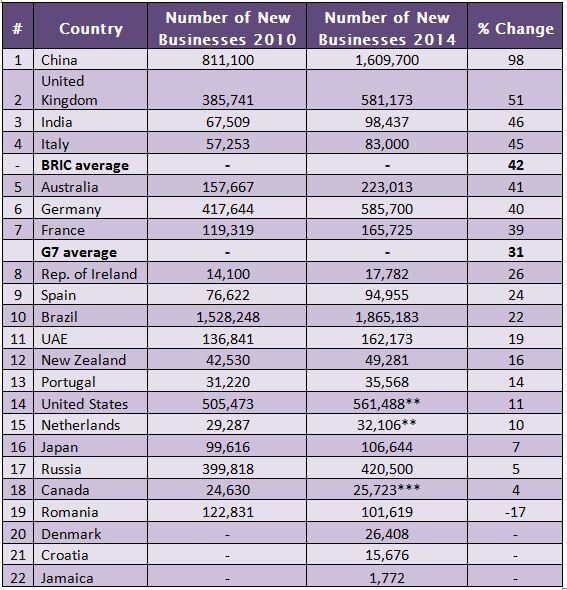Number of new Chinese businesses nearly doubled since 2010
UK leads Western Economies in growth in new start-ups
New business creation in China is outpacing the rest of the world despite its economic slowdown, with the number of new businesses created last year nearly doubling (up by 98%) compared to 2010, shows a new study by UHY, the international accounting and consultancy network.
The research revealed that the number of new companies created in China in 2014 was nearly double the number created in 2010, increasing from 811,100 to 1,609,700 per year.
According to UHY, new business creation is accelerating more quickly in the UK than in any of its Western rivals, with the number of newly established businesses in the UK increasing from 385,741 to 581,173 per year.
Third in the study was India, which saw a 46% increase in the number of start-ups. The BRIC economies averaged a 42% increase in the number of new businesses created over the same period.
UHY’s study shows that the Western European economies tended to see a bigger increase in the number of new business ‘births’ compared to other developed economies. The UK, Italy, Germany, and France had increases in the number of new businesses higher than the G7 average of 31%. By contrast the increase in new business creation over the period was 11% in the USA, 7% in Japan and 4% in Canada. Australia also beat the G7 average, with a 41% increase in the number of new businesses created.
UHY explains that the severity of the financial crisis and recession in many European countries prompted governments to take significant steps to encourage business creation. Common measures included changes designed to reduce the amount of tax due from start-ups and small companies, and to simplify the bureaucratic burden.
For example, Italy has significantly simplified the procedure for establishing new companies, so that it is now possible to establish a company with one euro of share capital. In Spain, steps have been taken to simplify the tax system and improve the online system for tax returns, reducing the administrative burden on small businesses. The reduction of the corporate income tax rate for new companies has also encouraged investment in businesses in Spain.
Many countries have also experienced an explosion of alternative finance providers, which has helped improve start-ups’ access to finance. It is estimated that non-bank funding now accounts for 30% of finance provided to companies across Europe.* An estimated Euros 3 billion of European non-bank funding now takes the form of peer-to-peer lending, crowd-funding and other new models.
UHY points out that to sustain growth in the number of new businesses being created, as well as to manage the global impact of the slow-down in the Chinese economy, governments cannot afford to slow the introduction of more business-friendly policies.
Comments Bernard Fay, Chairman of UHY, and one of the managing partners at UHY Fay & Co, UHY’s Spanish member firm: “Businesses in many European countries have now bounced back from what were enormously difficult economic conditions.”
“The next few years are not going to be without their own challenges, and governments globally need to find ways to help these new start-ups to grow into successful businesses and even the next generation of multi-nationals.”
“In many European economies there is still a long way to go in cutting down on bureaucracy, and in Spain, for example there is a need to look at peculiarities in the tax system that can leave many mid-sized companies paying higher marginal tax rates than their bigger rivals.”
“It is a similar situation in many South American countries. New businesses in Brazil, for instance, face a complex web of labour and tax laws but the government is now trying to encourage new business creation by offering SMEs substantially lower tax rates. In addition, the Brazilian government has been working – since 2011 – to make sure that they have official record of all small businesses and self-employed professionals, especially those that didn’t previously have a taxpayer record.”
“Alternative finance has been a major bonus to start-ups. As it grows in importance and profile, regulators face the significant question of how to find a balance in their regulatory approach to the sector that gives confidence to potential investors, but does not stifle innovation.”
Adds Michael Coughtrey, Managing Partner of UHY Haines Norton Sydney, UHY’s Australian member firm: “Registering a new business in Australia is quick and relatively inexpensive, and the government has introduced some welcome changes to support businesses once they start to create jobs and become profitable.”
“For example, in recent years we have seen the income tax rate for qualifying small businesses drop by 1.5%, and more generous rules for writing asset depreciation off against tax, as well as significant tax concessions for employee share schemes in start-up companies.”
“However, Australia has dropped out of the top 10 in the World Bank’s ‘Ease of Doing Business’ survey. With our economy bound to be affected by the slow-down of China, to remain competitive we need to continue to focus on making life easier for entrepreneurs and investors.”
*AFME (Association for Financial Markets in Europe)
**2013, the latest figures available
***2012, the latest figures available




